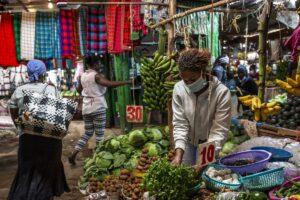- Kenya, Tanzania braces for torrential floods as Cyclone Hidaya approaches
- EAC monetary affairs committee to discuss single currency progress in Juba talks
- Transport and food prices drive down Kenya’s inflation to 5% in April
- Payment for ransomware attacks increase by 500 per cent in one year
- History beckons as push for Kenya’s President Ruto to address US Congress gathers pace
- IMF’s Sub-Saharan Africa economic forecast shows 1.2 percent GDP growth
- The US Congress proposes extending Agoa to 2041, covering all African countries
- Millions at risk of famine as fuel tax row halts UN aid operations in South Sudan
Month: May 2020
The outbreak of COVID19 has turned the world as we knew it into a bizarre nightmare that we cannot awaken from.
From governments to businesses and people, the impact of the coronavirus (COVID-19) is being felt by all around the world. In the weeks following the announcement that the novel Corona virus was indiscriminately attacking the old and the young, the rich and the poor, nations put measures in place to keep the virus at bay.
Across the world, while the number of coronavirus cases is slowing in China, elsewhere, cases are spilling over even as governments employ measures to navigate the complicated terrain. Thousands of people have lost employment leading to reduced or no income to survive on during the lockdown.
In addition to social distancing, limited travelling within and between towns, economies and governments in East Africa have encouraged moving away from cash and adopting digital payments. This …
This article aims to highlight the challenges and implications of COVID-19 in the agricultural sector using current industry trends and outcomes to forecast the impact of the pandemic on agricultural value chains and consumer behaviour in the short, medium and long term. Most importantly, however, this report proffers actionable innovations and systems that can be adopted and scaled up to negate the effects of the pandemic on food supplies to urban areas and industrial processors in Nigeria.
Short term (1-3months)
- Disruption of supply chains due to inter and intrastate border closures. An example being the pileup of trucks on the Kano-Kaduna road due to shutdowns on what is a key route for national grain distribution.
- The stock of grains does not seem to be hampered but there is a risk it will if the current situation persists for a period longer than 3-4 months. The
In the wake of Covid-19, the co-operative sector which is a key driver in Kenya’s economy has not been spared in experiencing the devastating shock waves caused by the pandemic that continues to ravage the world at an alarming rate. Savings and credit co-operatives (saccos) make up about 45% of Kenya’s Gross Domestic Product (GDP), with an asset base of over Ksh1 trillion, mobilized savings and deposits in excess of Ksh732 billion and a loan portfolio of Ksh700 billion. In addition, the sector employs more than 500,000 people whilst necessitating self-employment especially through lending.
The Ministry of Co-operative Development estimates that 80% of Kenya’s population derives its income either directly or indirectly through co-operative activities. In a recent report by the World Council of Credit Unions (WOCCU) Kenya has the largest co-operative movement in Africa and is ranked in 7th position globally, making it very pertinent in the economic …
The Covid-19 world pandemic has disrupted our lives in a way most can only fantasize about. It has not spared any sector and some are even making a kill from it. Talk of the entrepreneurial spirit in this country!
The same cannot be said of the insurance sector, however. For starters the insurance industry has stated that Covid-19 is not coverable because it falls under pandemics which are an exclusion in a typical insurance cover. A pandemic has to be defined by World Health Organisation (WHO) as such for it to qualify as an exclusion in an insurance product. Few insurance policies cover pandemics despite the potential for disaster, because the risk is not well understood and also difficult to price. But going forward there is a huge interest from companies looking for protection against business interruption suggesting that pandemic policies are the next big thing in commercial insurance.
When …
The coronavirus (COVID-19) pandemic has taken a new shift in South Africa, as the nation of more than 58 million anticipates to ease down its lockdown with phased reopening after rolling in the strictest movement restriction in the region.
According to information from the Financial Times, the South African government is discussing a five-level alert system, facilitating the current president Cyril Ramaphosa administration to reopen the country with low risk of contracting the virus.
Currently, the situation in South Africa has taken another shift, as Bloomberg News reported according to the health ministry, South Africa has 5,350 confirmed cases as of Wednesday, 354 more than yesterday, while the number of deaths recorded was 103.
Also, the ministry revealed that 11,630 tests were conducted in the past 24 hours, adding up the number of tests to 197,127.
However, the South African agricultural exports are slated to resume operations under the new …




